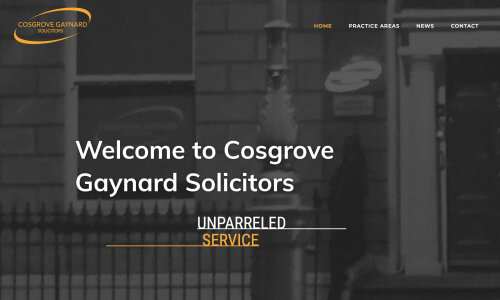Best Elder Abuse Law Lawyers in Dublin
Share your needs with us, get contacted by law firms.
Free. Takes 2 min.
List of the best lawyers in Dublin, Ireland
About Elder Abuse Law in Dublin, Ireland
Elder Abuse Law in Dublin, Ireland, aims to protect older adults from various forms of abuse, including physical, emotional, financial, and neglect. The legal framework supports efforts to ensure the safety and well-being of the elderly, recognizing their right to live free from harm and with dignity. As Ireland's population ages, there's a growing focus on safeguarding the rights and safety of older individuals, prompted by both national policies and international human rights conventions.
Why You May Need a Lawyer
There are several situations where individuals might require legal assistance under Elder Abuse Law in Dublin. These can include:
- Suspected physical or emotional abuse occurring in a care home or by a family member.
- Financial exploitation, such as unauthorized access to an elder’s bank accounts or coercion into changing a will.
- Neglect, including failure to provide adequate care, nutrition, or medical attention.
- Ensuring the implementation of power of attorney is in line with an elder's best interests.
- Concerns about capacity and the need for legal guardianship or decision-making intervention.
Local Laws Overview
The legal protections for the elderly in Dublin are enshrined in several key pieces of legislation and initiatives:
- The Health Act 2007 provides the regulatory framework for the operation of care homes.
- The Criminal Law (Sexual Offences) Act 2017 includes provisions for safeguarding vulnerable adults.
- The Assisted Decision-Making (Capacity) Act 2015 facilitates decision-making support and safeguards for individuals who may lack capacity.
- Adult safeguarding policy frameworks overseen by Ireland’s Health Service Executive (HSE).
These laws enable legal actions to be taken in response to elder abuse and neglect, and frameworks such as Safeguarding Ireland work in collaboration with the legal system to protect elders from harm.
Frequently Asked Questions
What constitutes elder abuse in Dublin, Ireland?
Elder abuse can refer to physical, emotional, financial exploitation, neglect, or any action that causes harm or distress to an older person.
How can I report suspected elder abuse?
Reports can be made to the local social services, Gardaí (police), or directly through the Health Service Executive (HSE) safeguarding teams.
What legal actions can be taken against perpetrators of elder abuse?
Legal actions may include criminal charges, protective legal orders, or civil litigation to recover financial losses or enforce guardianship.
Can an elder refuse legal intervention if they are being abused?
If the elder has the capacity, they can refuse intervention. However, if their capacity is found lacking, legal actions may be pursued by guardians or safeguarding bodies.
What role do solicitors play in elder abuse cases?
Solicitors provide legal advice, represent clients in court, assist with reporting abuse, and help prepare and implement documents like wills or powers of attorney.
Are there specialized solicitors for elder abuse in Dublin?
Yes, many solicitors specialize in elder law and are skilled in handling elder abuse cases.
What is the role of a trust in protecting an elder’s assets?
Trusts can be established to manage and protect an elder's assets, safeguarding them from potential financial abuse or exploitation.
How can elder abuse affect an individual legally and financially?
Elder abuse can lead to loss of assets, legal disputes, and emotional distress. Legal intervention often seeks to minimize these impacts and restore the elder’s rights and assets.
Can family members be held liable for elder abuse?
Yes, if it is proven that a family member engaged in abusive or neglectful behavior, they can be held legally accountable.
Where can I find more information about elder abuse law?
Contact local solicitors who specialize in elder law, the Law Society of Ireland, or organizations like Age Action Ireland for comprehensive advice.
Additional Resources
Those seeking further assistance can reach out to the following resources:
- Health Service Executive (HSE): Provides adult safeguarding support and resources.
- An Garda Síochána: Ireland's national police service, for reporting abuse and criminal activities.
- Age Action Ireland: Offers support services and advocacy for older people.
- Safeguarding Ireland: Works to promote the welfare and rights of vulnerable adults.
Next Steps
If you suspect elder abuse or require legal assistance, consider taking the following steps:
- Contact a solicitor specializing in elder law to discuss your situation and explore legal options.
- Gather any evidence or documentation that supports your concern or legal claim.
- Consider reaching out to trusted family members or friends for support.
- If immediate harm is suspected, contact emergency services or local authorities promptly.
- Utilize local resources and support networks to aid in resolving the situation effectively.
Tackling elder abuse requires nuanced legal and relational approaches, and professional legal guidance is invaluable in navigating these challenges effectively.
Lawzana helps you find the best lawyers and law firms in Dublin through a curated and pre-screened list of qualified legal professionals. Our platform offers rankings and detailed profiles of attorneys and law firms, allowing you to compare based on practice areas, including Elder Abuse Law, experience, and client feedback.
Each profile includes a description of the firm's areas of practice, client reviews, team members and partners, year of establishment, spoken languages, office locations, contact information, social media presence, and any published articles or resources. Most firms on our platform speak English and are experienced in both local and international legal matters.
Get a quote from top-rated law firms in Dublin, Ireland — quickly, securely, and without unnecessary hassle.
Disclaimer:
The information provided on this page is for general informational purposes only and does not constitute legal advice. While we strive to ensure the accuracy and relevance of the content, legal information may change over time, and interpretations of the law can vary. You should always consult with a qualified legal professional for advice specific to your situation.
We disclaim all liability for actions taken or not taken based on the content of this page. If you believe any information is incorrect or outdated, please contact us, and we will review and update it where appropriate.















